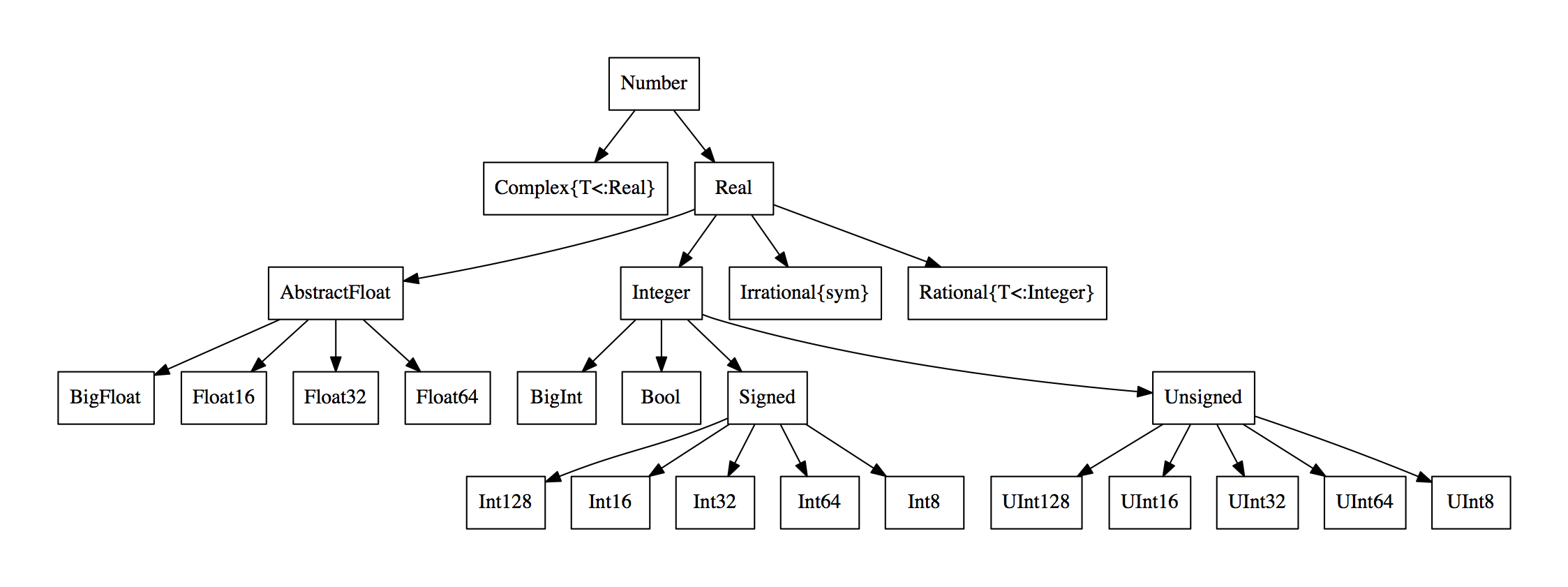Julia 語言設計與 JIT 編譯器¶
Julia 為什麼快?¶
Julia Taiwan 發起人 杜岳華¶
2019.8.18¶
Outline¶
- 型別系統(type system)
- 多重分派(multiple dispatch)
- 泛型程式設計(generic programming)
- Metaprogramming
- Reflection and introspection
- JIT compiler
Introduction¶
Type system¶
Type system¶
Type system¶
- Dynamic type, similar to symbolic programming
- Set-theoretic type
Multiple dispatch¶
Generic programming¶
- Parametric types and parametric methods
- Similar to multiple dispatch with parametric polymorphism.
- All types are first-class: can be dispatched and declared
Metaprogramming¶
- Macro
- Generated function
Macro¶
In [1]:
macro sayhello(name)
return :( println("Hello, ", $name) )
end
Out[1]:
@sayhello (macro with 1 method)
In [2]:
@sayhello "Andy"
Hello, Andy
Ref. official docs
Generated function¶
In [3]:
@generated function foo(x)
Core.println(x)
return :(x * x)
end
Out[3]:
foo (generic function with 1 method)
In [4]:
foo(5)
Int64
Out[4]:
25
In [5]:
foo("5")
String
Out[5]:
"55"
Ref. official docs
Compile time¶
Compiler overview¶
Compiler compile time¶
Compiler runtime¶
Compiler details¶
Compile time¶
How Julia compiler works?¶
Static Single Assignment form (SSA)¶
- Each variable is assigned exactly once.
- Every variable is defined before it used.
Simplify and improve the compiler optimization¶
- constant propagation
- value range propagation
- sparse conditional constant propagation
- dead code elimination
- global value numbering
- partial redundancy elimination
- strength reduction
- register allocation
Runtime¶
Runtime¶
Dispatch system¶
- Type-based dispatch system
- Dispatching a single tuple type of arguments
Functions¶
Julia functions are generic functions.
A generic function is a single function and consists of many methods.
The methods of a function is stored in a method table.
All objetcs in Julia are callable.
JIT compilation¶
Staged programming¶
Leverage the type in input of code and generate optimized code¶
@generated function foo(::Array{T,N}, ...) where {T,N}
...
x = Matrix{T}()
for i = 1:N
...
end
end
Hackable compiler¶
Python and Numba¶
Reflection and introspection¶
In [6]:
foo(x, y) = x + y # Source code
Out[6]:
foo (generic function with 2 methods)
In [7]:
expr = :(foo(1, 2))
Out[7]:
:(foo(1, 2))
In [8]:
dump(expr) # AST
Expr
head: Symbol call
args: Array{Any}((3,))
1: Symbol foo
2: Int64 1
3: Int64 2
In [9]:
@code_lowered foo(1, 2) # Julia IR
Out[9]:
CodeInfo( 1 ─ %1 = x + y └── return %1 )
Reflection and introspection¶
In [10]:
@code_typed foo(1, 2) # Typed Julia IR
Out[10]:
CodeInfo( 1 ─ %1 = (Base.add_int)(x, y)::Int64 └── return %1 ) => Int64
In [11]:
@code_llvm foo(1, 2) # LLVM IR
; @ In[6]:1 within `foo'
define i64 @julia_foo_12964(i64, i64) {
top:
; ┌ @ int.jl:53 within `+'
%2 = add i64 %1, %0
; └
ret i64 %2
}
In [12]:
@code_native foo(1, 2) # Assembly
.text ; ┌ @ In[6]:1 within `foo' ; │┌ @ In[6]:1 within `+' leaq (%rdi,%rsi), %rax ; │└ retq nopw %cs:(%rax,%rax) ; └
Metaprogramming interfaces¶

CUDAnative.jl¶
Details in multiple dispatch¶
Object graph¶
Multiple dispatch¶
- Call
f(x, y) - Method table:
typeof(f).name.mt - Argument tuple:
Tuple{typeof(f), typeof(x), typeof(y)}
Dispatch: look up method in method table with argument tuple¶
Parameter information is in the name of function.¶
Ref. Function calls
Multiple dispatch¶
In [13]:
typeof(sum)
Out[13]:
typeof(sum)
In [14]:
typeof(sum).name
Out[14]:
typeof(sum)
In [15]:
typeof(typeof(sum).name)
Out[15]:
Core.TypeName
Multiple dispatch¶
In [16]:
typeof(typeof(sum).name.mt)
Out[16]:
Core.MethodTable
In [17]:
typeof(sum).name.mt
Out[17]:
13 methods for generic function sum:
- sum(x::Tuple{Any,Vararg{Any,N} where N}) in Base at tuple.jl:395
- sum(r::StepRangeLen) in Base at twiceprecision.jl:536
- sum(r::AbstractRange{#s72} where #s72<:Real) in Base at range.jl:970
- sum(x::SparseArrays.AbstractSparseArray{Tv,Ti,1} where Ti where Tv) in SparseArrays at /build/julia/src/julia-1.1.1/usr/share/julia/stdlib/v1.1/SparseArrays/src/sparsevector.jl:1306
- sum(a::AbstractArray{Bool,N} where N) in Base at reduce.jl:417
- sum(arr::AbstractArray{BigInt,N} where N) in Base.GMP at gmp.jl:547
- sum(arr::AbstractArray{BigFloat,N} where N) in Base.MPFR at mpfr.jl:724
- sum(a::AbstractArray; dims) in Base at reducedim.jl:648
- sum(::typeof(abs), x::SparseArrays.AbstractSparseArray{Tv,Ti,1} where Ti where Tv) in SparseArrays at /build/julia/src/julia-1.1.1/usr/share/julia/stdlib/v1.1/SparseArrays/src/sparsevector.jl:1331
- sum(::typeof(abs2), x::SparseArrays.AbstractSparseArray{Tv,Ti,1} where Ti where Tv) in SparseArrays at /build/julia/src/julia-1.1.1/usr/share/julia/stdlib/v1.1/SparseArrays/src/sparsevector.jl:1331
- sum(a) in Base at reduce.jl:416
- sum(f, a::AbstractArray; dims) in Base at reducedim.jl:649
- sum(f, a) in Base at reduce.jl:399
Method sorting¶
- A concrete type is assigned a unique integer identifier (hash consing).
- These integer identifiers are used to loop up methods efficiently in a hash table.
- Linear search
- Sorting methods by specificity.
Details of compilation stages¶
Compilation stages¶
- parsing -
parse: text -> Expr (femotolisp) - expand macro -
macroexpand - syntax desugaring
- statementize control flow
- resolve scopes
- generate IR (lower) -
@code_lowered - top-level eval, method sorting -
methods - type inference
- inlining, high-level optimizations -
@code_typed - LLVM IR generation -
@code_llvm - LLVM optimizer, native code generation -
@code_native
